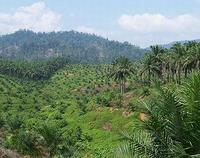 馬來西亞婆羅洲廷札河的一個原住民社區,最近在一項對抗沙勞越洲政府以及全世界最大棕櫚油公司IOI子公司的官司戰中,獲得重要的勝利。
馬來西亞婆羅洲廷札河的一個原住民社區,最近在一項對抗沙勞越洲政府以及全世界最大棕櫚油公司IOI子公司的官司戰中,獲得重要的勝利。
在原住民提起集體訴訟12年後的今天,美里高等法院星期三宣佈,由於沙勞越州政府與IOI柏麗達(IOI Pelita)公司簽訂的契約違法違憲,所以這份對克耶邦傳統土地的租賃契約實屬無效。
法院宣布,依照原告們所自行認定的社區邊界,5位代表龍特倫卡南村(Long Teran Kanan)提起集體訴訟的原告,在這些租賃的當地傳統土地上享有傳統的權利。
法院裁定,該公司及其代理人非法入侵原告的土地,並且對龍特倫卡南村原住民社區造成嚴重的傷害。原告的所有損失與遭受的損害評估,將由高等法院副司法常務官擇期宣告。
第一原告龍特倫卡南村村長安易(Lah Anyie)問道:「為什麼該公司與政府一邊指責我們違法居留,一方面政府卻又正式承認我們的村莊合法?」
法院同時否定了所謂的永續棕櫚油圓桌會議(Roundtable for Sustainable Palm Oil)的結論,IOI公司自稱,他們是以負責任的態度管理沙勞越的土地。
IOI公司是圓桌會議的創始成員,是一間馬來西亞的棕櫚油生產商,全球市場廣達65個國家。IOI柏麗達是它的子公司。
支持原住民社區的非政府組織以及其他爭取原住民傳統權利與土地權利的團體,都要求沙勞越政府不要對高等法院的裁決繼續上訴。
馬來西亞的婆羅洲資源研究所認為砂拉越政府應該讓判決確立。該研究所在周三的一份聲明中說:『雖然政府有權提出上訴,但必須考慮到政府對人民的優先順序,奉行「人民第一,高效行政」的口號』。
總部在瑞士的曼瑟基金會(Bruno Manser Fund)在1日對美里高等法院的判決表示歡迎,並且期待IOI停止伐除叢林的活動,立即退出廷札地區有爭議的土地。
一項英國廣播公司新聞部(BBC News)在去年12月的調查發現,在IOI有爭議的作業區內,發現大片被推倒的雨林。英國廣播公司記者報導:絕對的災難現場:大地上的一個巨大傷疤。
歐洲地球之友與荷蘭地球之友在3月15日發表了一份報告,提出證據表示,IOI在印尼婆羅洲從事大規模違法與非永續經營的活動。
該報告揭露了IOI集團的不法活動,並且指出歐洲對食用棕櫚油以及生物燃料的需求增加,導致了森林遭到砍伐,違反了環境法並造成亞洲的土地使用衝突。
IOI集團則在回應時聲稱,他們自行調查的結果發現,荷蘭地球之友的田野調查研究狹隘且偏頗,其中幾起事件的指控則是基於錯誤的報導。聲明中並得出結論說,沒有發生土地使用的衝突,也沒有違反任何法律與棕櫚油圓桌會議的規範。
該公司說:「IOI集團以公開提供相關利害關係人公司文件與各樣程序的方式,來表達其遵行永續發展目標的承諾、遵守法律規章,並持守圓桌會議的原則與標準的決心」
A native community on the Tinjar River in the Malaysian part of Borneo has won an important legal battle against the Sarawak state government and a subsidiary of IOI, one of the world's largest palm oil companies.
Twelve years after the natives' class action lawsuit was filed, the Miri High Court Wednesday declared leases of Kayan native customary lands "null and void" because they had been issued by the Sarawak state government to IOI Pelita in an illegal and unconstitutional manner.
The court declared that the five plaintiffs who represented their village of Long Teran Kanan in the class action case possess native customary rights over their native customary land area, both on the leased lands and beyond them "according to the plaintiffs' communal boundary."
The court ruled that the company and its agents "are trespassing" over the land of the plaintiffs and awarded both exemplary and aggravated damages to the Long Teran Kanan native community. Any damages and losses suffered by the plaintiffs will be assessed by the Deputy Registrar of the High Court at a date to be fixed.
Lah Anyie, the first plaintiff and also the headman for Long Teran Kanan asked, "Why does the company and the government accuse us of being squatters when our village is officially recognized by the government as a legitimate village?"
The Court decision also discredits the so-called Roundtable for Sustainable Palm Oil, which, according to IOI, had found in a probe that the company "had acted responsibly for the management of land in Sarawak."
IOI, a Malaysian palm oil producer serving markets in 65 countries, is a founding member of the Roundtable. IOI Pelita is its subsidiary.
Nongovernmental organizations that have supported this native community and others in their fight for native customary rights and land rights are urging the Sarawak state government not to appeal the High Court's ruling.
The Borneo Resources Institute Malaysia says the Sarawak government should let the ruling stand. "Even though the government has a right to appeal, they have to take into account their priorities to the people, espoused by the slogan, 'Peoples First, Performance Now,'" the institute said in a statement Wednesday.
The Bruno Manser Fund, based in Switzerland, said today that it welcomes the Miri High Court decision and "expects IOI to stop its jungle clearance activities and move out of the disputed lands in the Tinjar region with immediate effect."
Last December, a BBC News investigation found that vast tracts of former rainforest were being bulldozed in the disputed IOI operations area. BBC reporters documented "a scene of absolute devastation: a vast scar on the landscape."
On March 15, Friends of the Earth Europe and its Dutch branch Milieudefensie issued a report presenting evidence that IOI was responsible for large-scale illegal and unsustainable activities in the Indonesian part of Borneo.
The report exposes the illegal activities of the IOI Group and shows that the increasing demand in Europe for palm oil in food and biofuels is leading to deforestation, breaches of environmental law and land conflicts in Asia.
The IOI Group responded that its own investigation into these allegations found that "Milieudefensie's field research had been highly selective and limited, and that several incidents on which allegations were based were incorrectly reported. The investigation also concluded that no land conflicts have occurred, nor have any laws or RSPO regulations been violated."
"IOI Corporation is determined to demonstrate its commitment to its sustainability goals and its compliance with legal regulations and RSPO Principles and Criteria by openly providing concerned stakeholders with insight into company field documents and procedures," the company said.







